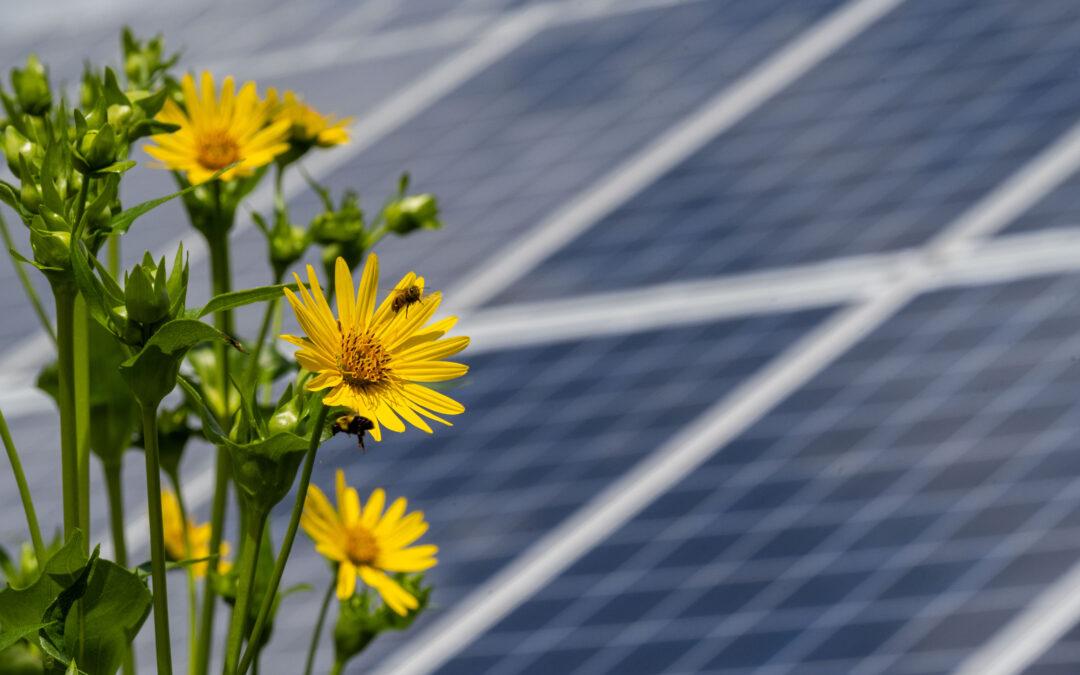There are a lot of perks for the bees that call O’Shea Solar Park in Detroit home.
There is plenty of pollinator-friendly ground cover, thanks to seeding done by DTE’s environmental team, there are hives where they can set up shop and someone who regularly ensures they don’t crowd those hives with too much honey.
The hives and honey harvesting are all part of a partnership between DTE and Bees in the D, a non-profit organization who contributes to the health of honeybees and other native pollinators, while educating the community about the importance of bees to the environment. The partnership began in 2021, when the organization installed two hives at the Detroit solar park in a location that is the ideal spot for the bees to call home. World Bee Day – May 20 – offers a chance to see just how vital this work is as people around the globe work to strengthen measures aimed at protecting bees and raise awareness about the importance of pollinators and the threats they face.
“They’re set away from the solar panels so none of the activities around the panels can affect them,” said environmental engineer Kristen LeForce. “They’re not going to get knocked over, no one is going to get stung, it was just a perfect fit.”
That perfect fit has made for some very happy bees. Both hives produced at high rates because of the abundant resources available to them at O’Shea, high enough that even more hives were added in 2023.
“They have access to a lot of pollen,” said Kristen. “They make a lot of honey, but the honeybees aren’t competing against other pollinators. There are enough resources for everyone.”
Every fall, Bees in the D harvests honey from the hives at O’Shea and other sites around the city, taking enough that the hive has room to grow but not too much so the bees have sufficient food to survive the cold winter months. When spring comes, the team at Bees in the D follows up with the hive to make sure it’s healthy and ready to continue producing for the next year.
For the hives on DTE’s land, the honey is either donated back to Bees in the D to sell to help continue its educational mission or bought by the company to give to community members and hand out during events at solar sites. In 2024, more than 200 jars of honey came out of the hives at O’Shea.
“Being good stewards to the environment as we’re continuing to build these large-scale projects is at the forefront of our mind,” said Kristen. “Honeybees and other native bees are declining at troubling rates. We have this opportunity to use our standing as a huge land manager to do more good, not just by making renewable energy, but also to help pollinators.”
You can even help the bees in your own back yard this World Bee Day. Let your lawn grow during #NoMowMay, which allows flowers to bloom and help early season pollinators. You can plant native plants in your gardens or even just pots on your porch, patio or balcony will help increase the available food and habitat for a variety of native bees and other pollinators. Even just sharing what you know about pollinators, buying local honey and seeking out locally grown organic foods can help the bees!
With monarch butterflies now listed as threatened under the Endangered Species Act and one out of every three bites of food we eat existing because of pollinators, this mission and partnership is more important than ever.
“It’s a cool multi-use for the land, a multi-use for the solar facility itself,” said Kristen. “The land not only serves to create energy but can also create honey to support native pollinators who are still there. It’s good for the world to support pollinators.”
